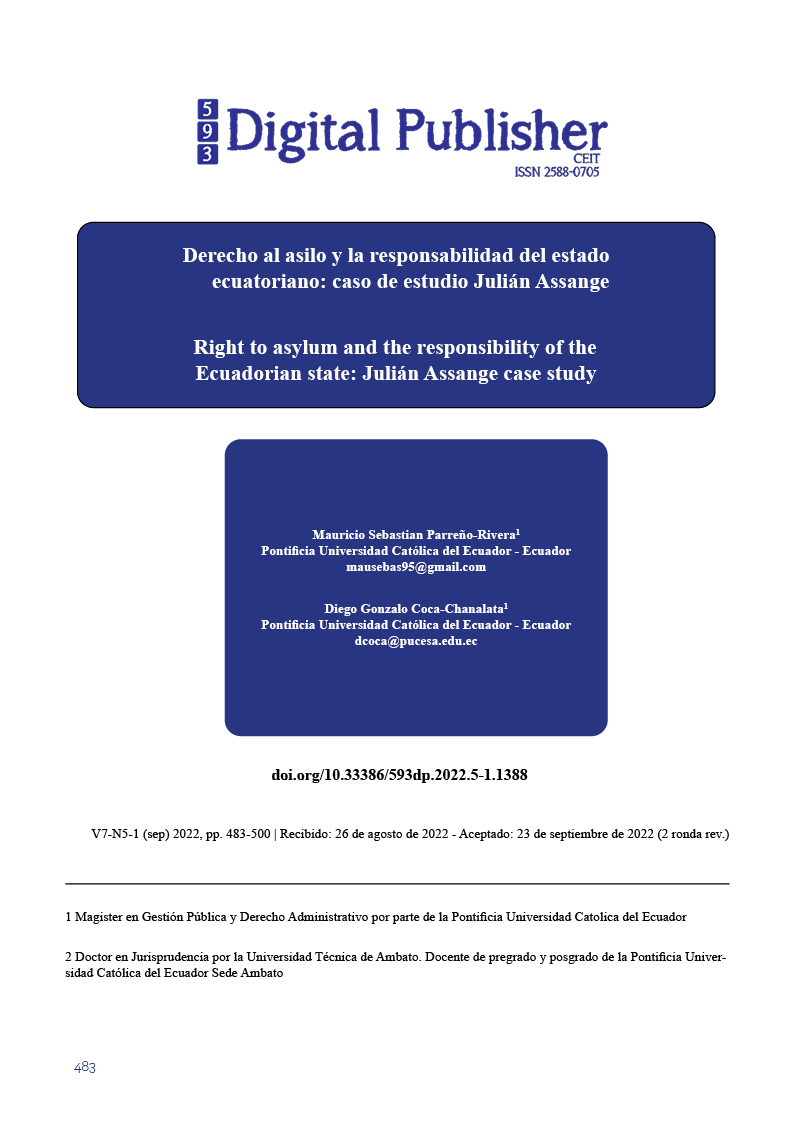Right to asylum and the responsibility of the Ecuadorian state: Julián Assange case study
Main Article Content
Abstract
Asylum is an entity of universal protection in human rights, whose modern origin is found in inter-American law, but its scope is universal, by virtue of the principles of non-refoulement, equal protection of the law and non-discrimination. In Latin America, the right of asylum is, therefore, a human right recognized as such in the American Declaration of Rights and Duties of Man, of 1948; in the American Convention on Human Rights, 1969; and, in the Caracas Convention on Diplomatic Asylum, of 1954, and in other regional instruments signed by the Ecuadorian state throughout the 20th century and since the end of the 19th century. The Ecuadorian state, by declaration of asylum, dated August 16, 2012, recognized the right of Mr. Julián Assange to seek, receive and enjoy asylum in any country after considering his well-founded fears of finding himself facing a real threat and potential persecution justified. politically motivated for having vindicated the rights of freedom of expression and information. In accordance with this rule of international law, Ecuador decided to recognize the Ecuadorian nationality of Mr. Julián Assange, granting him a letter of naturalization, bearing in mind that the Ecuadorian constitution proclaims certain principles of human mobility that cannot but be invoked in this asylum case, such as are the principles of universal citizenship and the gradual abolition of the condition of foreigner, rights that are guaranteed by our constitution. Pursuant to this antecedent, Mr. Julián Assange obtained Ecuadorian nationality and thereby acquired rights against the Ecuadorian State, as well as obligations before it. Later, when the State unilaterally and without establishing the proper procedure, withdrew his nationality, and this generated several legal conflicts, among them the due process, the legal security of the citizen, was violated; since in order to withdraw his nationality, in the first place the act that originated this right had to be declared harmful, by means of the injunction and through a process before the contentious administrative court. Finally, the process of granting the naturalization letter by the Ecuadorian state in favor of Julián Assange is analyzed as an acquired right, its connection with the right to identity and the veracity about the responsibility that Ecuador had when making decisions against an asylum seeker and later naturalized as an Ecuadorian; through the development of a jurisprudential research method from an explanatory descriptive research with a qualitative approach to reach the conclusions on this case.
Downloads
Article Details

This work is licensed under a Creative Commons Attribution-NonCommercial-ShareAlike 4.0 International License.
1. Derechos de autor
Las obras que se publican en 593 Digital Publisher CEIT están sujetas a los siguientes términos:
1.1. 593 Digital Publisher CEIT, conserva los derechos patrimoniales (copyright) de las obras publicadas, favorece y permite la reutilización de las mismas bajo la licencia Licencia Creative Commons 4.0 de Reconocimiento-NoComercial-CompartirIgual 4.0, por lo cual se pueden copiar, usar, difundir, transmitir y exponer públicamente, siempre que:
1.1.a. Se cite la autoría y fuente original de su publicación (revista, editorial, URL).
1.1.b. No se usen para fines comerciales u onerosos.
1.1.c. Se mencione la existencia y especificaciones de esta licencia de uso.
References
Assange, J. P. (2017). Solicitud de Nacionalidad Ecuatoriana mediante carta de naturalizacion. Londres.
Código Orgánico General de Procesos. (2015). Art.306. Quito: Corporacion de estudios y publicaciones.
Comadira. (2019). La Accion de Lesividad . Argentina: Astrea.
Comisión Interamericana de Derechos Humanos. (2010). Declaración de principios sobre libertad de expresión. En Principios.
Comisión Interamericana de Derechos Humanos. (2018). El acceso a la justicia como garantía de los derechos económicos, sociales y culturales: estudio de los estándares fijados por el sistema interamericano de derechos humanos. San José.
Constitución de la Republica del Ecuador. (2008). Montecristi: Corporacion de estudios y publicaciones.
Constitución Francesa. (1793). Articulo 120. Francia: I.E.S. Las Musas.
Convención sobre Asilo Político de La Habana. (21 de mayo de 1929).
Convención sobre Asilo Político de Montevideo. (1933). Articulo 1. Montevideo.
Coordinador General de Asesoria Juridica. (2017). Memorando Nro. MREMH-CGAJ-2017-0001. Quito.
Corte Interamericana de Derechos Humanos. (2001). Caso del Tribunal Constitucional Vs. Perú. Sentencia de 31 de enero de 2001. Serie C No. 71, párr. 71; Caso Baena Ricardo y otros Vs. Panamá. Sentencia de 2 de febrero de 2001. Serie C No. 72, párr. 127. San José.
Corte Interamericana de Derechos Humanos. (2005). Caso de las niñas Yean y Bosico Vs. República Dominicana. San José.
Corte Interamericana de Derechos Humanos. (2005). Caso Familia Pacheco Tineo Vs. Bolivia. Costa Rica .
Corte Interamericana de Derechos Humanos. (2014). Caso Familia Pacheco Tineo Vs. Bolivia. Opinión Consultiva OC-21/14. Costa Rica.
Corte Interamericana de Derechos Humanos. (2018). Opinión Consultiva Oc-25/18 de 30 de Mayo de 2018, Solicitada por la República del Ecuador. .
Corte Internacional de Justicia. (1975). Alegatos, Argumentos Orales, Documentos, Caso de Asilo (Colombia Vs. Perú). New York: Organización de las Naciones Unidas a la Asamblea General sobre la Cuestión del Asilo Diplomático.
Declaración Americana de los Derechos y Deberes del Hombre. (1948). Declaración Americana de los Derechos y Deberes del Hombre. Bogota.
Declaración Universal de los Derechos Humanos. (1948).
Dirección de asistencia judicial internacional y de movilidad humana. (2020). MREMH-DAJIMH-2020-0990-N.
Dromi, J. R. (1979). Acción de Lesividad. Mendoza: Revista de Administracion Publica.
Dromi, J. R. (2004). Derecho Administrativo. Buenos Aires: Ciudad de Argentina.
“Ecuador concede asilo político a Julian Assange para evitar su extradición”. (2012). Obtenido de El Confidencial: https://www.elconfidencial.com/mundo/2012-08- 16/ecuador-concede-asilo-politico-a-julian-assange-para-evitar-su-extradicion_499181/;
Espinosa, A. (2013). Refugio, asilo, extraterritorialidad: aclarando conceptos y recordando antecedentes. Uruguay: Enfoques.
Gil-Bazo, M. T. (2015). Asylum as a general principle of international law. International Journal of Refugee Law, 27(1), 3-28.
Guaita, A. (1953). El proceso administrativo de lesividad: El recurso contencioso interpuesto por la administración. Barcelona: Bosch.
Lafronte, V. (1951). El asilo y el caso de Haya de la Torre. Quito: Casa de la Cultura Ecuatoriana.
Lexis Finder. (06 de febrero de 2017). Art. 4.7. Ley Orgánica Del Servicio Exterior .
Ministerio de Relaciones Exteriores y Movilidad Humana. (2017). Resolucion Nro. 001-MREMH-VMH-2017.
Ministerio de Relaciones Exteriores, Comercio e Integración del Ecuador. (2012). “Declaración del Gobierno de la República del Ecuador sobre la solicitud de asilo de Julian Assange”. Comunicado Nro. 42.
Ministerio de Relaciones Exteriores y Movilidad Humana. (2019). Resolución No. 0000042. Asunto: Declárese lesivo, el acto administrativo contenido en la Resolución No. 0001-MREMH-VMH-2017 de 12 de diciembre de 2011 . Quito.
Organizacion de Estados Americanos. (1954). Convencion sobre Asilo Diplomatico. Caracas.
Organización de las Naciones Unidas. (1948). Declaración Universal de los Derechos Humanos. Articulo 15. New York.
Organización de las Naciones Unidas. (1975). Informe del Secretario General de la Organización de las Naciones Unidas a la Asamblea General sobre la Cuestión del Asilo Diplomático. New York.
Organización de los Estados Americanos. (2012). Reunión de Consulta de Ministros de Relaciones Exteriores. Washington D.C.
Organización de Estados Americanos . (1928). Convención sobre Asilo. La Habana.
Pacto Internacional de Derechos Civiles y Políticos. (1966). Articulo 2.2.
Pais, E. (19 de mayo de 2017). “Cronología del Caso Assange”. Obtenido de https://elpais.com/internacional/2017/05/19/actualidad/1495195394_983636.html
Rotaeche, C. G. (1997). Derecho de Asilo y “no rechazo” del Refugiado. Madrid: Dykinson.
Secaira, P. (2004). Curso de Derecho Administrativo. Quito: Universitaria.
Senacom. (2012). Gobierno ecuatoriano otorga asilo a Julian Assange. Obtenido de https://www.comunicacion.gob.ec/gobierno-ecuatoriano-otorga- asilo-a-julian-assange/
Sineiroa, J. M. (2013). El Asilo Diplomatico: connotaciones actuales de un atavismo internacional. Mision Juridica: Revista de derechos y Ciencias Sociales.
Tribunal Distrital de lo Contencioso Administrativo con sede en el distrito Metropolitano de Quito. (06 de 09 de 2019). Proceso Lesividad. Causa judicial 17811-2019-01266. Quito, Pichincha, Ecuador: Funcion Judicial.
Velasco, D. d. (2013). Instituciones de Derecho Internacional Publico. Madrid: Tecnos.
(21 de noviembre de 2018). Obtenido de ¨Julian Assange¨ Historia y Biografía: https://historia- biografia.com/julian-assange/



